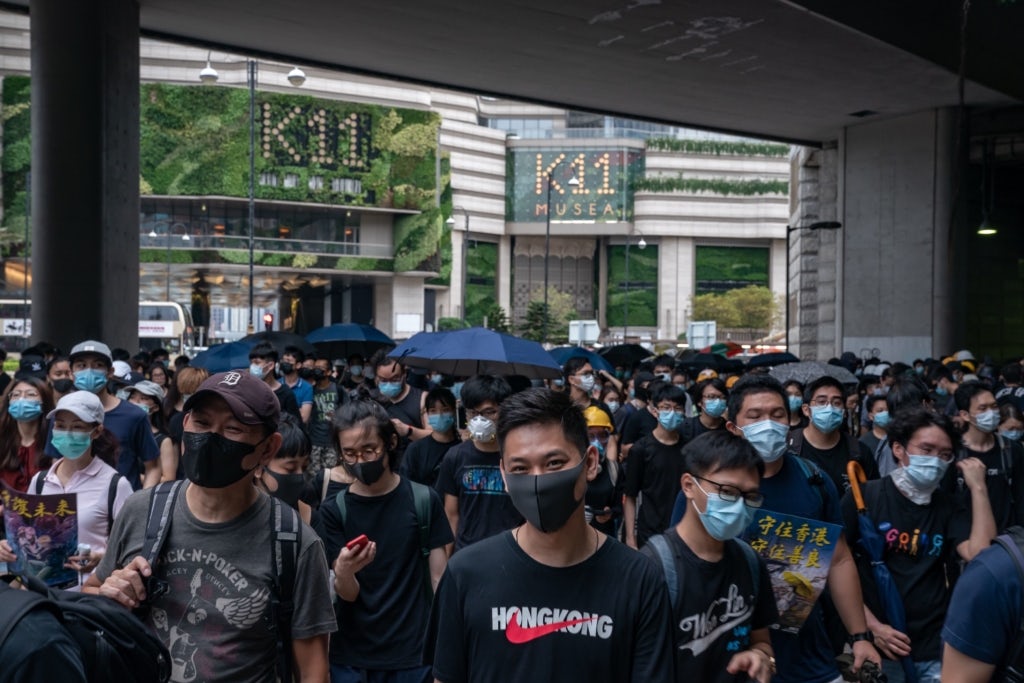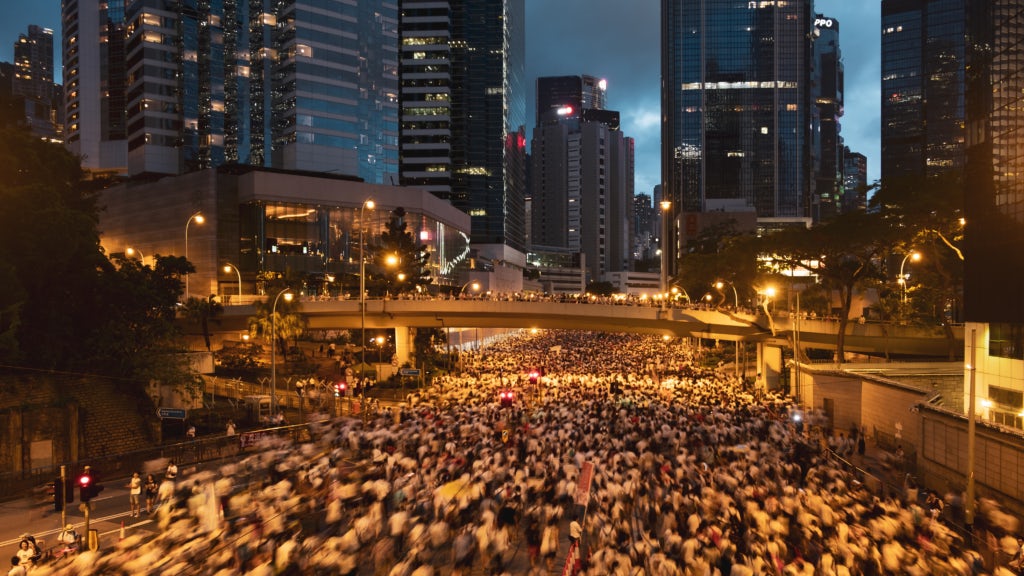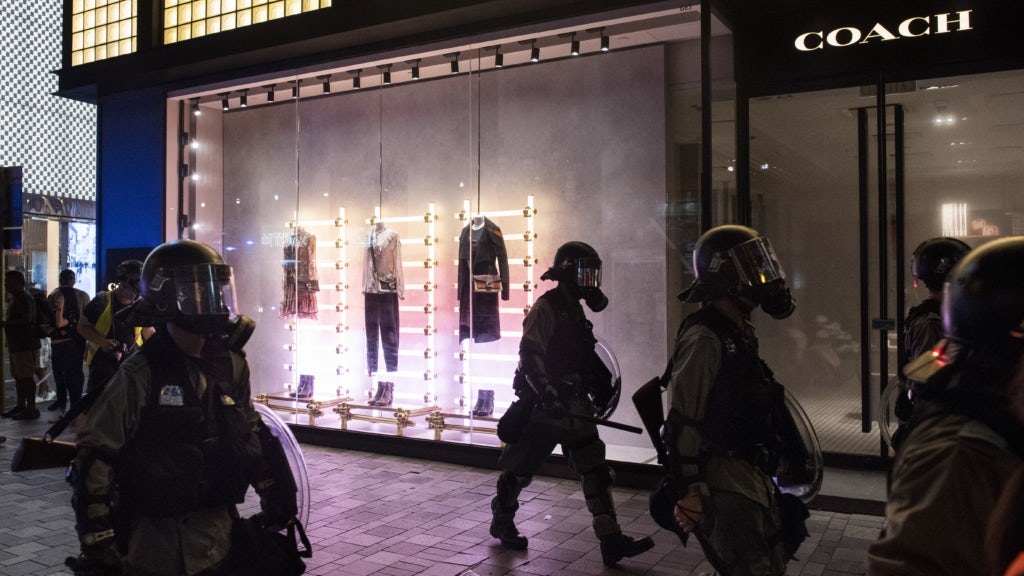HONG KONG, China — An all-black ensemble has always been in fashion. But as Hong Kong passes its twenty-second week of pro-democracy protests, the look has become a polarising political symbol.
An all-black uniform — black T-shirts, black jeans and face masks, often paired with helmets, goggles and umbrellas — was first seen on the streets in mid-June, after local police began attempting to disperse protesters with rubber bullets and tear gas, says Dr. Tommy Tse, assistant professor in media and culture at the The University of Hong Kong’s Department of Sociology.
“Protesters wanted to use [the colour of their clothes] to communicate their sorrow, anger and regret of the government's pushing the [now withdrawn] extradition law as well as the [local] police's increasing violence” against demonstrators, says Tse. “It also creates a stronger visual effect when it comes to the aerial photos by the media, symbolising a sense of unity and determination against the unprecedentedly suppressive political environment.”

Protesters march on a street on August 3, 2019 in Hong Kong, China. | Source: Getty Images
Last month, the special administrative region’s government enacted a prohibition on face masks to deter rioters, which only escalated protests across Hong Kong. The uniform has also ignited backlash from the Chinese government, which recently banned exports of black clothing to the city.
The South China Morning Post reported that in a notice issued by a mainland courier company in July, China’s customs authority prohibited the delivery of Hong Kong-bound black clothing, in addition to items such as masks and flags. Another notice from Guangdong-based company Express boasted an even more extensive list, which included “black shirts and other clothing.”
Though some brands may be hit harder than others by the ban, China Market Research Group Managing Director Ben Cavender reckons there will be a limited effect on retailers’ sales in Hong Kong. “Buyers are likely to switch to other colours for the time being or will look at stock already available in Hong Kong.” Meanwhile, the chaos has driven locals to shop more online, and customers are likely to opt for cross-border e-tailers if their go-to brands can’t fulfil their wish lists.
"I’ve had people give me dirty looks because they recognise what my black outfit means."
“I think if it's a large brand they are going to be very careful of angering Beijing, so [they] are probably not going to be stocking much in the way of black T-shirts,” Cavender adds. “Independent retailers probably have the ability to source from other markets, though customs may end up cracking down to some extent as well.”
Though protests typically take place from Friday to Sunday, this hasn’t deterred some from sporting black outfits during the week. “It’s an easy way to show where you stand,” says 22-year-old student Cindy Wong, who takes part in demonstrations on weekends. But as the protests continue to disrupt the city’s tourism and retail sectors, Hong Kong residents have become divided on whether highly disruptive mass protests are the way forward.
“Many people are supportive, but I’ve also had people give me dirty looks because they recognise what my black outfit means,” Wong adds. “Police officers pay more attention to us in public.”
White T-shirts, too, have become politically charged. On July 22, a mob of men in white T-shirts attacked black-clad protesters and passengers at Hong Kong’s Yuen Long railway station. Reports quoted witnesses alleging that the men in white were triad gangsters, and victims accused the riot police (who arrived at the scene after the mob had left) of deliberately avoiding the clash. The melee was followed by several altercations between the alleged triad members in white, and protestors in black.

Protestors demonstrate against controversial extradition law in Hong Kong | Source: Shutterstock
According to Tse, protesters wore white on June 9, when the demonstrations kicked off. “It was long before the [triad attack], but the pro-democracy mass public later adopted such a stark colour contrast...to symbolise the antagonism between the government and [people].” He notes that the irony of triad members being associated with white, “which typically epitomises peace, purity, justice and freedom,” also came into play.
“I’m sure some protesters are still wearing their white shirts to work during the week,” says Wong. “But as my school doesn’t require it, I choose not to.”
Though the chaos has seen Hong Kong’s September retail sales grow at their slowest pace in 15 months, T-shirt sales are being uniquely affected.
According to Kayla Marci, market analyst at retail analytics firm Edited, Hong Kong’s mass market retailers pulled back their assortments of white T-shirts over the past three months compared to the month prior. The shade has decreased by 30 percent, driven predominantly by a reduction in men's T-shirts, whereas new arrivals of black T-shirts have increased by 11 percent.
New arrivals of black T-shirts have increased by 11 percent in Hong Kong
At Japanese retailer Muji’s outpost in WTC mall (located in the city’s once-bustling retail haven Causeway Bay), a staff member confirmed that though business has been sluggish in general, white T-shirt sales have slowed while black T-shirt sales have picked up. A salesperson at Uniqlo’s Lee Theatre flagship said the same. Muji and Uniqlo have not responded to BoF’s requests for comment.
Months of unrest have had a well-documented effect on the luxury sector in Hong Kong, which as one of the top five global luxury travel destinations has long been a shopping hot spot for mainland tourists and accounted for 5 to 10 percent of global luxury sales, according to Bernstein data. The city’s retail sales took another dive in September, falling 18.3 percent year-on-year according to recent government data. Tourist visits plunged around 50 percent in the first half of October, according to Hong Kong Chief Executive Carrie Lam.

Riot police officers rush through the streets during anti-government protests in Hong Kong | Source: Getty Images
After Prada announced its plans to shut its flagship store in Hong Kong’s retail haven Causeway Bay next year due to low foot traffic, the store’s landlord told the South China Morning Post that it is amenable to slash rents by 44 percent.
As the political chaos goes on to drive tourists and shoppers away from stores, both luxury and mass retailers will continue to see slow sales overall, but the black clothing trading ban adds another layer of complexity to an already highly-charged business environment. “These kinds of spikes or drops in demand create massive issues for inventory planning, [which] will leave a lot of brands wondering what to do in regard to Hong Kong for future seasons,” Cavender adds, noting the impending challenges facing e-commerce players serving the city. “However, most are opportunistic, inexpensive operations that will likely try to pivot to something else.”
Related Articles:
Hong Kong Enters its First Recession in 10 Years Amid Protests
As Luxury Suffers in Hong Kong, Tiffany Turns to Mainland China
Startups
via https://aiupnow.com
Zoe Suen, Khareem Sudlow
